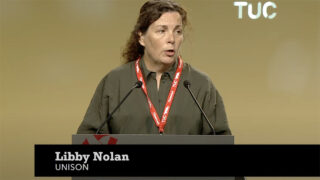A large-scale survey of women working in both the public and private sector has revealed huge changes in the world of work for women over the age of 50.
The findings of the survey of more than 5,500 women is being released by UNISON on the eve of International Women’s Day (8 March) to focus attention on the rapid rise in the number staying at work longer. The union is warning that the rise in the state pension age will only exacerbate this trend.
However, the survey shows that women have fewer chances for promotion or moving to a higher-grade job.
Many have to remain in full time employment beyond the age of 64 – at a time when they could be winding down and looking forward to retirement. One in three has primary caring responsibility for an adult dependent, with few options for flexible working or work-life balance.
UNISON wants a better deal for these older workers.
UNISON Assistant General Secretary, Karen Jennings, said:
“The world of work for women over the age of 50 is changing dramatically. Many of these older women, suddenly find that they have to work years longer than they expected.
“Rapid rises in the state pension age, the Government’s austerity agenda and the disproportionate impact it has on women, have combined to force the change.
“If women are expected to work longer, they should equally have better promotion prospects and expect to have better training and pay. It’s not right that they should have to continue in work with very little tangible benefits. Women should not be expected to continue working on a low pay, no say basis. We want to see a better deal for them.”
The survey found:
* 61% of women of 50+ work full-time
* 20% work 25-34 hours
* More than 50% of women aged 60-64 work full-time
* 33% 65+ are still working full-time
* 25% of women 50+ who work part-time because that is all the hours available in their job
* 33% say they would increase their hours; 50% of those in lowest grade jobs say the same
* 25% of women 50+ work part-time because they can manage financially
* Nearly 10% of women have more than one paid job
* More than 33% would like to move to a higher grade/job
* Fewer than 6% feel they have good promotion opportunities
* Fewer than 50% feel they have good training opportunities
However, there is also a problem for women who wish to reduce their hours, but cannot. They have to work full time, or more hours to stay in employment; they have no choice.
40% of the women working full-time said theywould work fewer hours if they could.
Reasons cited for cutting hours include: wind down before retirement; outside interests; health issues; need to care for dependents.
Fewer than 50% who asked for new working patterns have been able to do so to their satisfaction.
The report was produced by UNISON to inform the work of the Labour Party Commission on Older Women and to contribute to an understanding that if you want to change work so dramatically, you can’t continue to have it on a low pay, no say basis.
The report underpins UNISON’s campaigning work on:
· implementing the Equality Act 2010 provision on dual discrimination which would provide protection for older women;
· ending the abuse of Zero Hours Contracts;
· better trainingand promotion opportunities for older women;
· action to closethe gender pay gap.
Ends
Notes to Editors
5,578 women took part in the survey, analysed by Labour Research Department, between the end of November 2013 and the beginning of January 2014.


